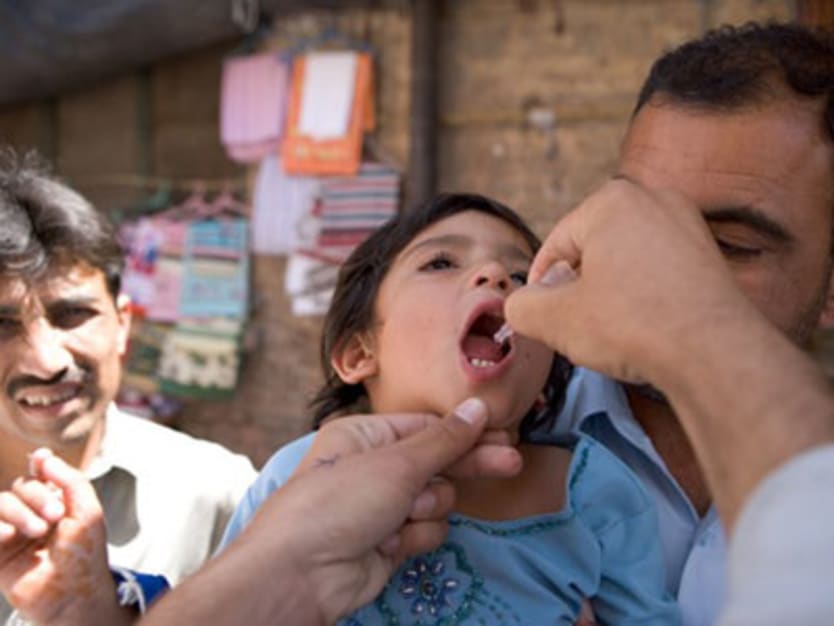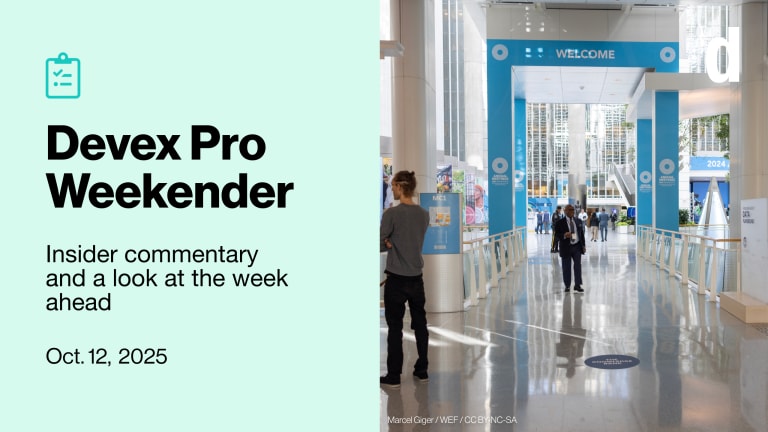
Tensions resume in Pakistan after a fresh wave of attacks threaten polio vaccine workers, as prior killings remain unsolved.
Pakistan’s anti-polio fight gained another casualty on Wednesday, when an unidentified gunman shot and killed a policeman who was protecting a team of polio vaccine workers doing in-house service in northwestern Pakistan.
The gunman escaped.
This could yet be another unsolved crime against vaccine workers in the South Asian country. The past months have seen repeated eruptions of violence, claiming many lives.
No culprit
There has been a whirlwind of reports alleging that the attacks were made by the Pakistani Taliban, which banned polio vaccinations in some stronghold areas as a protest against the espionage campaign by the CIA that used a fake polio program to intercept Osama Bin Laden.
But no one has actually come forward to claim responsibility for the killings.
Aziz Memon, chair of Rotary International’s Pakistan PolioPlus Committee under the Global Polio Eradication Initiative, linked the violence to the Pakistani general elections to be held this May.
Memon called for better security arrangements for polio vaccine workers, but admitted that the anti-polio campaign across Pakistan has not been significantly affected by the events.
“Usually, campaigns stopped in those areas where the attacks were made, but again start the next day,” he added during an interview with Devex.
No justice
Support With Working Solution (SWWS) executive director Javed Akhter, who saw six of his 56 medical staff dead after an ambush by two unnamed gunmen in January, told Devex about the struggle to seek justice for the killings.
“We are afraid not because of [a possible] attack… [but] those who lost their lives are yet unable to receive justice because the investigation process is either slow or even zero,” he said.
Akhter is not optimistic about the future of Pakistan’s anti-polio fight while investigations are at a standstill.
“Situation is still not good and becomes worse after every passing day,” Akhter added.
The SWWS is among the NGOs that the Pakistani government began working with after many donors stopped backing anti-polio drives in the country because of the attacks. It supports the government through facilitating vaccination services in target villages on a regular basis.
This group and and similar ones in the conflict-ridden country have resorted to employing security agencies to protect their dwindling ranks.
Akhter said the SWWS hires security guards and requires security trainings for all of its personnel. The SWWS does not receive any funding for these additional precautions.
The Pakistan PolioPlus Committee, for its part, also uses security agencies, but also builds bridges with local communities. It sets up transit points in between high-risk areas, where communities can go to get vaccinated.
At a turning point
The security threat is just the tip of the iceberg.
Memon listed other challenges faced by the anti-polio campaign in Pakistan, among them religious misconceptions that vaccines are harmful, militant groups, poor hygiene, unsanitary water and a lack of routine immunizations.
“Religious people also hate aid workers,” said Akhter. “Aid workers’ living cost has also increased.”
Pakistan is one of the only 3 countries in the world — along with Afghanistan and Nigeria — where polio is still endemic.
But progress is being made as polio cases in Pakistan have slid more than 50 percent this April at 6, as compared to about 20 in the same month of 2012.
Pakistan is now at a turning point in its fight to eradicate the crippling disease. Will it be polio-free by 2018, as recently targeted by the Global Polio Eradication Initiative?
The SWWS head said that “we must appreciate their efforts, but in Pakistan coverage still needs attention, and some areas here in Pakistan are still not accessible due to militancy. Displaced population is increasing day by day, which also affects vaccinations.”
On the other hand, while the Pakistan PolioPlus Committee chair acknowledges that issues like militancy have stood in the way of polio eradication, he is confident that Pakistan should be free of polio even before 2018 given the sharp drop in current polio cases.
Read more development aid news online, and subscribe to The Development Newswire to receive top international development headlines from the world’s leading donors, news sources and opinion leaders — emailed to you FREE every business day.






